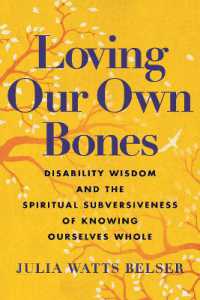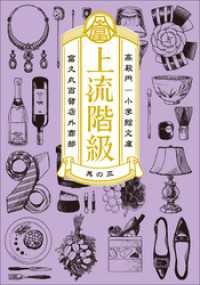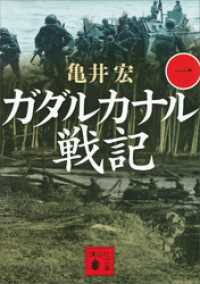- ホーム
- > 洋書
- > 英文書
- > Philosophy
基本説明
Explores the work of Guo Xiang, a Neo-Taoist thinker who developed a radical philosophy of freedom and spontaneity.
Full Description
Explores the work of Guo Xiang, a Neo-Taoist thinker who developed a radical philosophy of freedom and spontaneity.
The Penumbra Unbound is the first English language book-length study of the Neo-Taoist thinker Guo Xiang (d. 312 C.E.), commentator on the classic Taoist text, the Zhuangzi. The author explores Guo's philosophy of freedom and spontaneity, explains its coherence and importance, and shows its influence on later Chinese philosophy, particularly Chan Buddhism. The implications of his thought on freedom versus determinism are also considered in comparison to several positions advanced in the history of Western philosophy, notably those of Spinoza, Kant, Schopenhauer, Fichte, and Hegel. Guo's thought reinterprets the classical pronouncements about the Tao so that it in no way signifies any kind of metaphysical absolute underlying appearances, but rather means literally "nothing." This absence of anything beyond appearances is the first premise in Guo's development of a theory of radical freedom, one in which all phenomenal things are "self-so," creating and transforming themselves without depending on any justification beyond their own temporary being.
Contents
Acknowledgments
PART I
Introduction
The Classical Chinese Philosophical Background
An Overview of Guo Xiang's Philosophical Project
The Problem of Spontaneity and Morality in Earlier Xuanxue
Guo's Solution:The Image of Traces
The Dangers of Traces
PART II
Interactivity Without Traces: "Vanishing (Into) Things"
The Unification of Independence and Interdependence
PART III
Lone-Transformation 99
The Unity of Activity and Nonactivity
APPENDIX A
Guo Xiang's Use of the Term Xing: The Inherency of Change and the Confluence of Chance, Freedom, and Necessity in the Notion of the Self-So
APPENDIX B
Comparative Notes on Freedom and Determinism
Notes
Bibliography
Index






